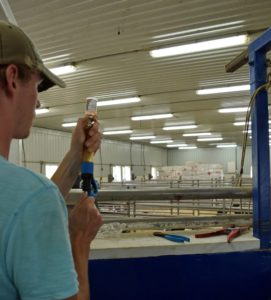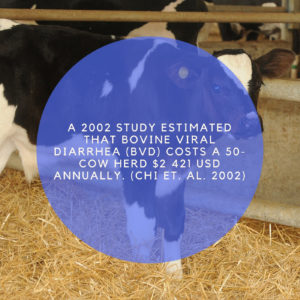Healthy Calf Conference
Follow to stay up-to-date on all Healthy Calf Conference updates. Speaker announcements, sponsorship information, registration announcements, and more.

Calves are born with an underdeveloped immune system. Key parts of a calf’s immune system are present, but at much lower levels than an adult cow. This means the newborn calf’s immune system is slower to respond to pathogens (disease-causing bacteria, virus, or microorganism) and when it does, the response is weak. The immune system is not very effective until the calf is two to four weeks of age, and development continues until the calf reaches breeding age. This leaves the calf vulnerable to disease for a significant period of time at a crucial point in its development.

Antibodies, or immunoglobulins, are the part of the immune system that identifies pathogens, so the other cells of the immune systems can attack and kill the pathogen. Each antibody is specific to a pathogen, so every time a new pathogen attacks, the immune system creates a new antibody to identify that pathogen. This is why vaccinations work – they expose the calf to a weaker version of the pathogen so that it can develop an antibody. This way, when the body encounters the real version of the pathogen, antibodies are ready and waiting. This is also why the first time calves get sick from a pathogen, they are usually sicker and take longer to recover, but the second time they don’t get sick or may recover sooner.
When calves are born, they have never encountered pathogens, so they have few to no antibodies. Calves start to develop antibodies four days after birth, but these antibodies don’t reach useful levels until 16-32 days of age, and adult levels aren’t achieved until 4 months of age. After vaccination, it takes about 30 days for calves to develop levels of antibodies that protect them from disease. This is why in the first weeks of life and the weeks after vaccination, calves are still very susceptible to disease.
The good news is that colostrum transfers antibodies from the dam to the calf. This protects the calf while it develops its own antibodies. The dam’s antibodies come from encountering pathogens in the environment or vaccinations. Giving a dam’s colostrum to her calf helps the calf prepare for specific pathogens found on their home farm. Vaccinating the dam can increase the antibodies shared with the calf through colostrum. Calves fed colostrum from vaccinated dams have significantly higher antibody levels than calves from unvaccinated dams. Vaccination of the dam is only beneficial to the calf if it receives enough clean, high-quality colostrum quickly after birth.

The calf’s immune system and antibody levels are constantly changing over the first weeks of life. Recommended ages for vaccinations and boosters are chosen so that the calf’s immune system is developed enough to respond by making antibodies without being overwhelmed.
Vaccines are less effective when given to sick or stressed animals. For this reason, vaccinations should not occur at the same time as other stressful times such as weaning, transport, or re-grouping.
Vaccination is a component of good calf care but does not replace excellent calving, colostrum, and pre-weaned calf management. Even vaccinated calves can become sick if calf care is weak in other areas. Work with your herd veterinarian to develop a vaccine protocol for both cows and calves. Ensure your veterinarian is familiar with your calf care program so they can provide you with the best recommendations for your farm.
Follow to stay up-to-date on all Healthy Calf Conference updates. Speaker announcements, sponsorship information, registration announcements, and more.
The Codes of Practice are nationally developed guidelines for the care and handling of farm animals. They serve as our national understanding of animal care requirements and recommended practices.